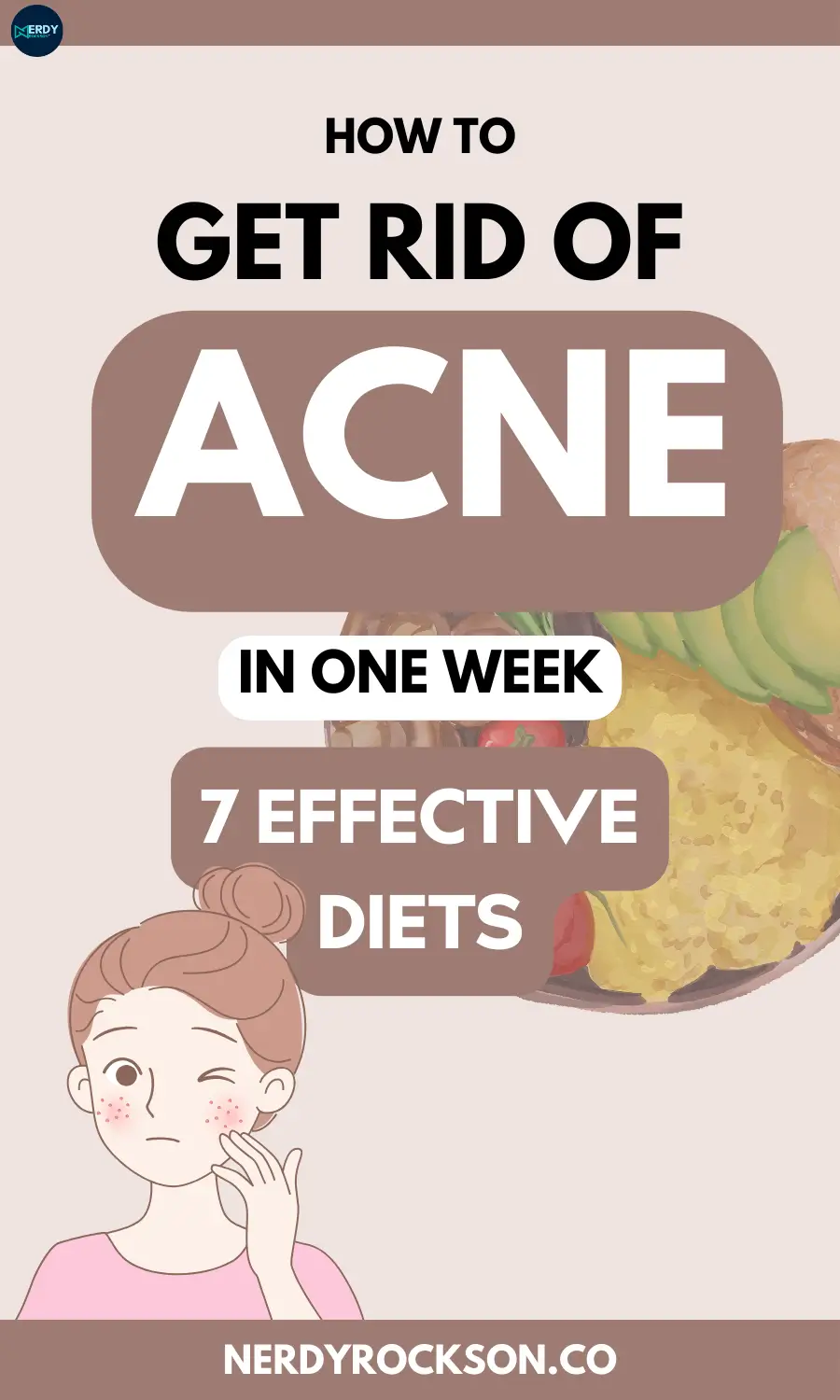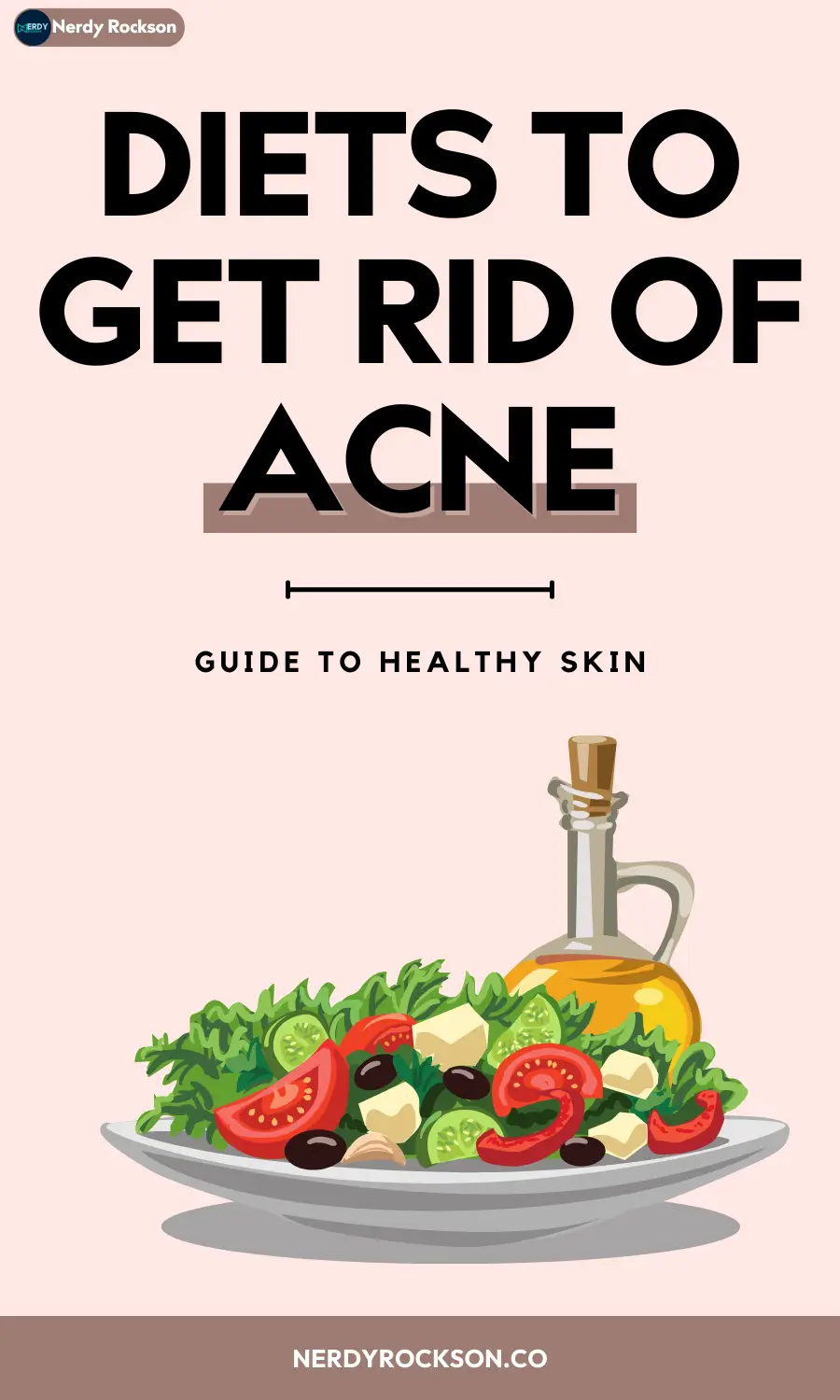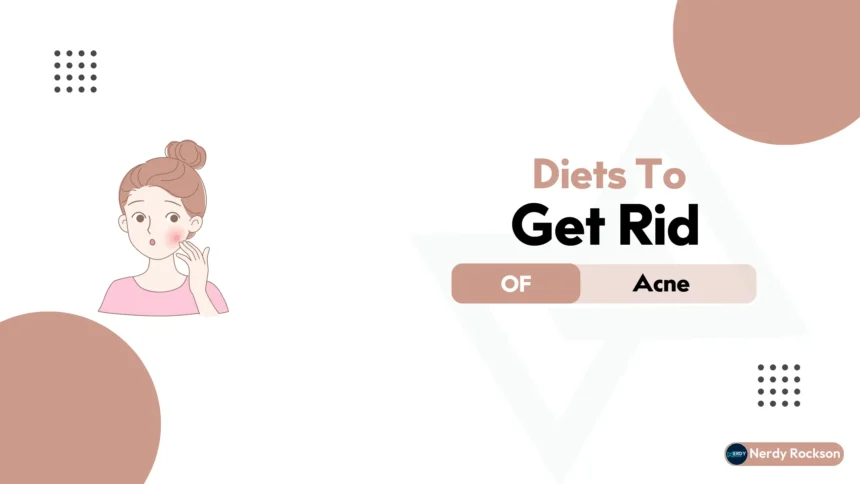If you’re one of the millions globally frustrated by acne, don’t worry, you’re not alone and there is hope! This article aims to provide a rundown on different diets to get rid of acne within a week. We’ll explore diverse eating plans that have scientific backing for their effectiveness in improving skin health. If you’ve asked yourself, “Can what I eat really make a difference?” The answer is a resounding “yes.”
A 2014 research by the Journal of Clinical and Aesthetic Dermatology found that certain food groups can indeed affect your skin health.[1] Let’s dive deep into these various diets to get rid of acne and how they can help you achieve a clearer, healthier complexion.
Your diet is a powerful tool that can naturally treat many conditions, including acne.
So, remember, you are not alone in your fight against acne. The understanding of the relationship between diet and acne is continually progressing, providing us with valuable ways to manage this common skin condition. Instead of just experiencing the cycles of breakouts and clear skin, you can use these diets to get rid of acne to maintain consistently healthy skin.
Understanding Acne
Let’s start with fundamentals, shall we? Acne, as you may well know, is a common skin condition that manifests as an outbreak of pimples or zits. This isn’t just a superficial issue – it penetrates deeper into the skin, primarily affecting your oil glands and hair follicles.
It’s not just about having oily or dirty skin – these are old tales we need to discard. Acne is largely caused by hormonal fluctuations which lead to excess production of sebum, or oil, by your skin’s sebaceous glands. Other contributing factors might include stress, certain medications, and yes, your diet.
This is where the ‘you are what you eat’ mantra rings true! Ever heard of the phrase ‘food-face’ connection? It is real. Some research suggests that certain diets could potentially help mitigate acne.[2] But remember, while these diets may help, they can’t cure acne on their own. They can, however, support your overall treatment plan by fostering a healthier internal environment. So, let’s delve deeper into this topic and help you discover diets to get rid of acne.
Oh, and one more thing, that old wives’ tale about chocolate and greasy foods causing acne? It doesn’t stand up to scientific scrutiny. While an unhealthy diet might contribute to acne by promoting inflammation and oxidative stress, it’s not as simple as blaming it on one or two food items. It’s about the overall dietary pattern.
Diet and Acne
Let’s dive into the relationship between diet and acne. What you eat can indeed play a crucial role in exacerbating or alleviating acne. Scientific evidence suggests that our diet can significantly affect our skin’s health, including the development and severity of acne.
Food affects acne in two main ways. Firstly, certain foods can cause inflammation in the body, which can lead to acne breakouts. For instance, processed foods, sugary snacks, and fried foods are known culprits. These foods can raise your blood sugar quickly, causing an insulin spike that leads to inflammation. Consuming these types of food regularly can make acne symptoms worse over time.
Secondly, some deficiencies in certain vital nutrients, like zinc, vitamins A and E, and omega-3 fatty acids, can also exacerbate acne. These nutrients play a key role in maintaining skin health, and a deficiency can lead to breakouts.
On a brighter note, certain foods can alleviate acne. Foods rich in antioxidants, omega-3 fatty acids, and vitamins can help lower inflammation, reduce oil production, and support skin health. Foods such as fresh fruits, vegetables, lean proteins, and healthy fats are your allies in the battle against acne. Scientific research, including studies published in the Journal of the American Academy of Dermatology, supports the role of diet in acne prevention and treatment.[3]
Understanding the link between our diet and acne can help us make informed choices about what we put on our plates. Incorporating acne-friendly diets can therefore be a valuable addition to your skin-care routine, helping you get rid of those pesky spots faster. Remember, all change takes time, so be patient with your skin and stick to your new dietary habits for visible results.


Diets to Get Rid of Acne
Here are seven effective diets to get rid of acne:
1. The Low Glycemic Diet
The Low Glycemic Diet requires you to heavily lean on foods that have a low glycemic index (GI). It’s particularly lauded for its role in controlling blood sugar and insulin levels. But did you know that it could also be one of your potent weapons against acne?[4]
Foods in this diet cause a slow, moderate rise in your blood sugar, reducing the spike in insulin levels. Why is this significant? Well, excess insulin can trigger an increased production of skin cells and sebum – two culprits that block your skin pores leading to breakouts.
Foods that fall within the low GI range, typically under 55, include whole grains, most fruits, vegetables, nuts, lean proteins, and legumes. So, your plate could be decked with nutritious servings of oatmeal and strawberries for breakfast, grilled chicken salad for lunch, and lentil soup for dinner.
Moreover, research indicates that a Low Glycemic Diet can improve both acne symptoms and insulin sensitivity, making it a win-win for your skin and overall health.[5]
Given the diversity of foods within the Low Glycemic Diet, incorporating it into your routine shouldn’t be too daunting. You’d be embracing food groups that keep your skin happy and boost all-around wellness. Remember, it could take a few days for your body to adjust and start reflecting positive changes in your skin.

The Low GI Diet Cookbook
The Low GI Cookbook brings you over 70 tempting recipes based on these established principles.
2. The Mediterranean Diet
Let’s set sail for the Mediterranean – nutritionally speaking, of course. The Mediterranean diet, rich in fresh fruits, vegetables, whole grains, and lean proteins, reigns as a champion when it comes to diets to get rid of acne. Here are some compelling reasons why you might want to give this diet a shot.
The central theme of the Mediterranean diet is the focus on whole foods. Think fresh fruits, leafy vegetables, whole grains, legumes, olive oil, and lean protein sources such as fish, poultry, and dairy. These foods are not only beneficial for your overall health but are also known for their skin-enhancing properties.
Fresh fruits and vegetables contain an abundance of antioxidants.[6] These mighty warriors combat free radicals that damage your skin cells, leading to less inflammation and fewer acne breakouts.
Whole grains and lean proteins are crucial for maintaining stable blood sugar levels. Unstable blood sugar can trigger your skin to produce excess oil, leading to clogged pores and the formation of acne.
Lastly, the generous use of olive oil in the Mediterranean diet provides healthy monounsaturated fats and antioxidants that help nourish and protect your skin.
As you embark on a journey into the Mediterranean diet, remember that consistency is key. Not only is this diet great for clearing up your skin, but it also promotes heart health, and weight management, and could improve your mood. So why not give it a try and enjoy the clear, acne-free skin and the other health benefits that come with it?

The 30-Minute Mediterranean Diet Cookbook
101 Easy, Flavorful Recipes for Lifelong Health
3. The Vegan Diet
Choosing a vegan diet could be the solution to your acne problems. This means eating only plant-based foods and avoiding anything that comes from an animal.
Let’s look at the benefits of a vegan diet for fighting acne. Acne is often caused by inflammation in the body and overactive glands in the skin. A vegan diet is full of fruits and veggies that have helpful nutrients, like Vitamins A, C, and E. These antioxidants can help lessen inflammation.
Plus, a vegan diet might help keep your hormones balanced. Dairy products, which are in many common diets, can throw your hormones off balance and make acne worse. By going vegan, you avoid this issue.
Try to stick to ‘whole food’ veganism, meaning mostly fruits, vegetables, legumes, grains, and nuts. Be careful of processed vegan foods, because they can have hidden sugars and unhealthy fats that boost acne.
In short, going for a balanced, whole-food vegan diet could be what you need. But change your diet gradually and with advice from a professional, so your body gets the nutrients it needs and adjusts to the new diet smoothly.

The Complete Plant-Based Cookbook
500 Inspired, Flexible Recipes for Eating Well Without Meat (The Complete ATK Cookbook Series)
4. The Paleo Diet
You might be wondering how a paleo diet, known for its emphasis on eliminating processed foods, could pave the way for clearer skin. Well, the answer lies in what you’re skipping – the refined sugars, artificial flavourings, sodium, and unhealthy fats found in processed foods. These ingredients can trigger inflammation, a tell-tale culprit behind acne breakouts.
A research study published in the Journal of Investigative Dermatology suggests a positive correlation between high-glycemic diets, which are typically high in processed foods, and acne.[7] Moving away from such foods, as encouraged by the Paleo diet, can contribute to an overall reduction in acne.
The Paleo diet focuses on whole, unprocessed foods, such as lean meats, fruits, vegetables, and nuts—foods our ancestors would have eaten. These foods are rich in nutrients like zinc, vitamin A, and omega-3 fats, which are known for their skin-enhancing properties. Zinc reduces inflammation and slows down the overproduction of oil in the skin, vitamin A encourages healthy skin production, and omega-3 fats fight inflammation.
By committing to a Paleo diet, you’re not only reminiscing on our caveman days but also actively helping your skin to fend off acne. Remember, it may take more than a week to see effective results, but a consistent, healthy diet is a proven route to improved skin health.

The Whole30 Slow Cooker
150 Totally Compliant Prep-and-Go Recipes for Your Whole30 ― with Instant Pot Recipes
5. The Anti-Inflammatory Diet
The Anti-Inflammatory Diet, as the name suggests, is particularly focused on reducing inflammation within the body. What makes it one of the effective diets to get rid of acne is its potential to soothe and heal the inflammation that is often a major part of acne flare-ups.
Centred on consuming a diverse range of nutritious, unprocessed foods abundant in antioxidant compounds, this diet encourages eating fruits, vegetables, whole grains, lean proteins, healthy fats, and anti-inflammatory spices such as turmeric and ginger. It’s also important to limit the consumption of processed foods, including sugary beverages and refined grains. In effect, this diet not only reduces inflammation but can also significantly improve skin health.
Research continually supports the assertion that anti-inflammatory diets can positively influence skin health. For instance, a study published in the Journal of Translational Medicine has demonstrated that this diet type can dampen the inflammatory response, reducing acne severity.[8] Following an anti-inflammatory diet may therefore not only improve your complexion but also enhance your overall health and wellbeing, contributing to a diet that gets rid of acne.
Remember, while diets can aid in the management and reduction of acne, they are not considered as standalone treatments. It is always a good idea to consult with a dermatologist or a nutritionist to formulate a comprehensive and holistic acne management plan that suits your unique needs.

The Complete Anti-Inflammatory Diet for Beginners
A No-Stress Meal Plan with Easy Recipes to Heal the Immune System
6. The Omega-3 Diet
Smoothing out your path towards an acne-free complexion is the Omega-3 diet. But how exactly does it work? You’ve probably heard about omega-3 fatty acids – the good fats. Unlike their infamous relatives, these fats are actually beneficial for your skin.
Omega-3 fatty acids are known to exhibit potent anti-inflammatory properties. Acne, as you might remember, is a condition largely driven by inflammation. Hence, consuming a diet rich in these healthy fats could mean less red, swollen acne on your skin. Right from flaxseeds and walnuts to fish like salmon and mackerel, there’s a wide range of food choices you can consider for your daily dose of omega-3.
Research has had its eye on the correlation between omega-3 and acne. A study published in the Journal of Lipids found that people given fish oil containing EPA and DHA, key types of omega-3, experienced significant clearance in acne after 12 weeks.[9] This suggests that an omega-3-rich diet could provide the ammunition needed to combat acne.
Managing your acne may seem like an ongoing battle. But with the right diets to get rid of acne, such as the Omega-3 diet, you can turn the tide in your favour. So, here’s to a healthier, happier, and less inflamed you!
7. The Probiotic-Rich Diet
Since we’re talking about diets to get rid of acne, we certainly can’t overlook the Probiotic-Rich Diet. This diet is surging on the back of increasing evidence that links gut health with skin health, making it an exciting new player in the field. But what does it entail exactly? Simply said, it involves consuming an array of foods that are high in probiotics. These foods are mainly fermented and some common examples include yoghurt, kefir, kimchi, sauerkraut, and kombucha.
A diet rich in probiotics aids in maintaining the balance of ‘good’ bacteria in your gut. Packed with live microorganisms, these probiotic foods replenish our gut with friendly bacteria. It’s believed that these bacteria play a key role in the health and wellness of our skin, due to the gut-skin axis. The gut-skin axis is a term used to describe the close relationship between gut health and skin health. When your gut is happy and balanced, your skin often reflects this by being clearer and more radiant.
While it might seem unfathomable that your gut and skin are connected, scientific research supports this idea. A study in the Journal of Clinical Gastroenterology[10] indicated that probiotics could serve as a potential treatment for acne due to their ability to restore gut microflora. This healthy gut flora in turn helps decrease inflammation and produces short-chain fatty acids that support gut wall integrity, thus reducing leaky gut syndrome which can lead to inflammation and acne.
So taking it all into account, incorporating probiotic-rich foods into your meals can not only bolster your gut health but simultaneously work towards clearing up your skin. It’s a win-win dietary decision!

The Probiotic Kitchen
More Than 100 Delectable, Natural, and Supplement-Free Probiotic Recipes – Also Includes Recipes for Prebiotic Foods
Conclusion
So there you have it, an extensive guide to some of the most effective diets to get rid of acne. Each of these diets focuses on the primary principles of eating whole, nutritious foods that won’t spike your blood sugar levels, cause inflammation, or stack up on harmful fats. It’s important to remember that while these diets can significantly aid in managing and clearing acne, they’re not miraculous, instant cures. It usually takes a little over a week or so to start seeing improvements.
Implementing these diets should be a part of a wider acne management routine, which should include suitable skincare and a healthy lifestyle. That said, remember not to be too hard on yourself. Enjoy the journey of discovering what works best for you, because your overall health will benefit from these changes as well.
One last thought, everybody’s body responds differently to dietary changes, and what might work for others may not necessarily work for you. It’s a good practice to listen to your body and note changes or improvements. You may want to consider consulting with a health professional or dietitian before drastically changing your diet.
Disclaimer
While diet can certainly play a crucial role in managing acne, it’s essential to keep in mind that everyone’s body is unique, and what works wonders for one person may not have the same results for another. The “diets to get rid of acne” mentioned in this article are suggestions backed by scientific research and proven benefits for the majority but aren’t guaranteed to work for everyone.
Also, remember that these diets should be integrated as part of a healthy and balanced lifestyle. Regular exercise, sufficient sleep, stress management, and a good skincare regime should go hand in hand with your dietary changes. If you have severe acne or if acne is significantly impacting your quality of life, it’s crucial to seek professional medical advice. A healthcare professional can provide comprehensive guidance and, if necessary, prescribe medication to better manage your skin health.
This article does not provide medical advice. Its purpose is to give informative and engaging content regarding potential diets for managing acne. It does not replace professional medical advice, diagnosis, or treatment. Always consult with a healthcare provider for any questions about your health and hygiene.
Reference
[1] ^ Katta, R., & Desai, S. P. (2014). Diet and Dermatology: The Role of Dietary Intervention in Skin Disease. The Journal of Clinical and Aesthetic Dermatology, 7(7), 46-51. https://www.ncbi.nlm.nih.gov/pmc/articles/PMC4106357/
[2] ^ Bowe, W. P., Joshi, S. S., & Shalita, A. R. (2010). Diet and acne. Journal of the American Academy of Dermatology, 63(1), 124-141. https://doi.org/10.1016/j.jaad.2009.07.043
[3] ^ Zari, S., & Alrahmani, D. (2017). The association between stress and acne among female medical students in Jeddah, Saudi Arabia. Clinical, Cosmetic and Investigational Dermatology, 10, 503-506. https://doi.org/10.2147/CCID.S148499
[4] ^ Meixiong, J., Ricco, C., Vasavda, C., & Ho, B. K. (2022). Diet and acne: A systematic review. JAAD International, 7, 95-112. https://doi.org/10.1016/j.jdin.2022.02.012
[5] ^ American Academy of Dermatology: CAN THE RIGHT DIET GET RID OF ACNE? https://www.aad.org/public/diseases/acne/causes/diet
[6] ^ Healthline Media: Anti-Acne Diet https://www.healthline.com/health/anti-acne-diet
[7] ^ Khayef, G., Young, J., Burns-Whitmore, B., & Spalding, T. (2012). Effects of fish oil supplementation on inflammatory acne. Lipids in health and disease, 11, 165. https://doi.org/10.1186/1476-511X-11-165
[8] ^ Pullar, J. M., Carr, A. C., & M. Vissers, M. C. (2017). The Roles of Vitamin C in Skin Health. Nutrients, 9(8). https://doi.org/10.3390/nu9080866
[9] ^ Jung, J. Y., Kwon, H. H., Hong, J. S., Yoon, J. Y., Park, M. S., Jang, M. Y., & Suh, D. H. (2014). Effect of dietary supplementation with omega-3 fatty acid and gamma-linolenic acid on acne vulgaris: a randomised, double-blind, controlled trial. Acta dermato-venereologica, 94(5), 521–525. https://doi.org/10.2340/00015555-1802
[10] ^ Salem, I., Ramser, A., Isham, N., & Ghannoum, M. A. (2018). The Gut Microbiome as a Major Regulator of the Gut-Skin Axis. Frontiers in Microbiology, 9. https://doi.org/10.3389/fmicb.2018.01459










